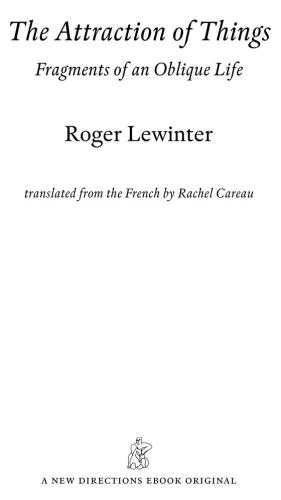
The Attraction of Things
کتاب های مرتبط
- اطلاعات
- نقد و بررسی
- دیدگاه کاربران
نقد و بررسی

September 19, 2016
Lewinter’s serpentine “fragments of an oblique life” nominally recount three years in a man’s life, but they more closely resemble a work that his narrator wants to translate: “a text that, improvised on each occasion in a state of concentration, was a simple verbal process” for its writer, but for the reader becomes a “labyrinth from which to find the way out.” The narrator is an accomplished translator and avid collector of antique records, Kashmir shawls, and other objets d’art, and is increasingly solitary. His elderly father, his only living parent, is growing fragile: “Making up for twenty years in three weeks he suddenly became an old man.” An ex-girlfriend whose new book is finally finished mentions that she’s “getting married in two hours.” The narrator’s relationships with men afford him the understanding that gender is ultimately unimportant, “since it is negated for the body that in its fulfillment is escaped,” but these relationships have also proven transitory. In this ephemeral world, the flea market offers consolations and coincidences within which the narrator locates a deeper meaning. Finding an intricately woven shawl, or the old sound recording of a dancer in which only the music and “a sharp tap of the castanets sufficed to evoke in its brilliance the entirety of beauty,” he moves closer and closer to revelation. Lewinter’s sentences can span several pages, moving backward and forward through narrative time; through their possible frustration, readers too may approach enlightenment.

A reissue of the author's 1985 novella, an elliptical meditation on possessions and their loss.This work by French-born novelist Lewinter (Story of Love in Solitude, 1989, etc.) has a definite arc, following the declining health of the narrator's parents. But it'd be off-base to say it has a plot: Lewinter is a prose poet, delivering long, sinuous, and complex sentences that switch back and forth in time and weave around the story. (This edition includes the original French text to compare to Careau's translation.) So though he's contemplating mom's and dad's mortality, Lewinter's hero is doing so through the filter of objects: a coveted LP; a bespoke shawl; Rainer Maria Rilke's poetry; a set of vintage porcelain. Rather than suggesting that the narrator's fixation on stuff is misguided, Lewinter delivers an appreciation of the spiritual power of things: the shawl, for instance, possesses a "serene luminosity" whose threads are "equal parts solid, liquid, ethereal"; a singer on a record "becomes an elaboration of the divine." Compared to the blunter depictions of his father's trips in and out of the hospital and ultimately to hospice, the narrator can seem shallow; a brief fling with a street drunk only bolsters the notion. But Lewinter's narrator is more interested in aesthetics than in morals. He seeks "that which transfigures the void," and because he feels that's more likely to be found in a song that can't die, his remove from his father has a certain poignancy. The wooliness of the narration doesn't wholly sell the point, but Lewinter unquestionably brings a lot of gravitas to a brief, abstracted tale. A provocative, sometimes-baffling set of riffs on inanimate objects and death, in that order. COPYRIGHT(1) Kirkus Reviews, ALL RIGHTS RESERVED.

























دیدگاه کاربران